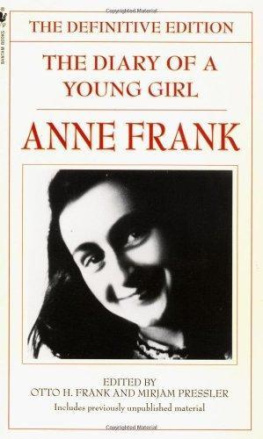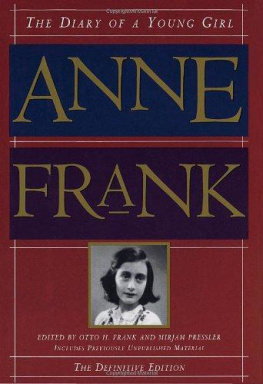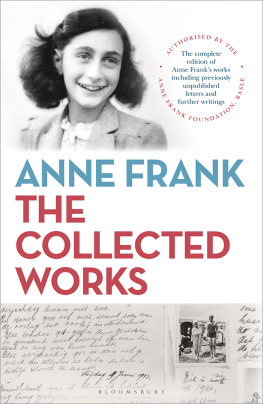Anne Frank - Tales From The Secret Annex
Here you can read online Anne Frank - Tales From The Secret Annex full text of the book (entire story) in english for free. Download pdf and epub, get meaning, cover and reviews about this ebook. year: 1997, publisher: Bantam Books, genre: Non-fiction. Description of the work, (preface) as well as reviews are available. Best literature library LitArk.com created for fans of good reading and offers a wide selection of genres:
Romance novel
Science fiction
Adventure
Detective
Science
History
Home and family
Prose
Art
Politics
Computer
Non-fiction
Religion
Business
Children
Humor
Choose a favorite category and find really read worthwhile books. Enjoy immersion in the world of imagination, feel the emotions of the characters or learn something new for yourself, make an fascinating discovery.
- Book:Tales From The Secret Annex
- Author:
- Publisher:Bantam Books
- Genre:
- Year:1997
- Rating:5 / 5
- Favourites:Add to favourites
- Your mark:
- 100
- 1
- 2
- 3
- 4
- 5
Tales From The Secret Annex: summary, description and annotation
We offer to read an annotation, description, summary or preface (depends on what the author of the book "Tales From The Secret Annex" wrote himself). If you haven't found the necessary information about the book — write in the comments, we will try to find it.
Tales From The Secret Annex — read online for free the complete book (whole text) full work
Below is the text of the book, divided by pages. System saving the place of the last page read, allows you to conveniently read the book "Tales From The Secret Annex" online for free, without having to search again every time where you left off. Put a bookmark, and you can go to the page where you finished reading at any time.
Font size:
Interval:
Bookmark:
On the morning of August 4, 1944, sometime between ten and ten-thirty, a car pulled up at 263 Prinsengracht. Several figures emerged: an SS sergeant, Karl Josef Silberbauer, in full uniform, and at least three Dutch members of the Security Police, armed but in civilian clothes. Someone must have tipped them off.
They arrested the eight people hiding in the Annex, as well as two of their helpers, Victor Kugler and Johannes Kleimanthough not Miep Gies and Elisabeth (Bep) Voskuijland took all the valuables and cash they could find in the Annex.
After the arrest, Kugler and Kleiman were taken to a prison in Amsterdam. On September 11, 1944, they were transferred, without benefit of a trial, to a camp in Amersfoort (Holland). Kleiman, because of his poor health, was released on September 18, 1944. He remained in Amsterdam until his death in 1959.
Kugler managed to escape his imprisonment on March 28, 1945, when he and his fellow prisoners were being sent to Germany as forced laborers. He immigrated to Canada in 1955 and died in Toronto in 1989.
Elisabeth (Bep) Voskuijl Wijk died in Amsterdam in 1983.
Miep Santrouschitz Gies is still living in Amsterdam; her husband Jan died in 1993.
Upon their arrest, the eight residents of the Annex were first brought to a prison in Amsterdam and then transferred to Westerbork, the transit camp for Jews in the north of Holland. They were deported on September 3, 1944, in the last transport to leave Westerbork, and arrived three days later in Auschwitz (Poland).
Hermann van Pels (van Daan) was, according to the testimony of Otto Frank, gassed to death in Auschwitz in October or November 1944, shortly before the gas chambers were dismantled.
Auguste van Pels (Petronella van Daan) was transported from Auschwitz to Bergen-Belsen, from there to Buchenwald, then to Theresienstadt on April 9, 1945, and apparently to another concentration camp after that. It is certain that she did not survive, though the date of her death is unknown.
Peter van Pels (van Daan) was forced to take part in the January 16, 1945 death march from Auschwitz to Mauthausen (Austria), where he died on May 5, 1945, three days before the camp was liberated.
Fritz Pfeffer (Albert Dussel) died on December 20, 1944, in the Neuengamme concentration camp, where he had been transferred from either Buchenwald or Sachsenhausen.
Edith Frank died in Auschwitz-Birkenau on January 6, 1945, from hunger and exhaustion.
Margot and Anne Frank were transported from Auschwitz at the end of October and brought to Bergen-Belsen, a concentration camp near Hannover (Germany). The typhus epidemic that broke out in the winter of 19441945, as a result of the horrendous hygienic conditions, killed thousands of prisoners, including Margot and, a few days later, Anne. She must have died in late February or early March. The bodies of both girls were probably dumped in Bergen-Belsens mass graves. The camp was liberated by British troops on April 12, 1945.
Otto Frank was the only one of the eight to survive the concentration camps. After Auschwitz was liberated by Russian troops, he was repatriated to Amsterdam by way of Odessa and Marseille. He arrived in Amsterdam on June 3, 1945, and stayed there until 1953, when he moved to Basel (Switzerland), where his sister and her family, and later his brother, lived. He married Elfriede Markovits Geiringer, originally from Vienna, who had survived Auschwitz and lost a husband and son in Mauthausen. Until his death on August 19, 1980, Otto Frank continued to live in Birsfelden, outside Basel, where he devoted himself to sharing the message of his daughters diary with people all over the world.
Francine Prose
One problem confronting every writer of fiction or nonfiction is the question of background. How much must a reader know in order to make sense of what the author is trying to convey? In a diary entry dated June 20, 1942, but written almost two years afterward, Anne acknowledges the necessity of giving Kitty, her invented confidante, enough information to enable her to follow the narrative. I dont want to set down a series of bald facts in a diary like most people dobut no one will grasp what Im talking about if I begin my letters to Kitty just out of the blue, so Ill start by sketching in brief the story of my life.
Well return to this entry later, but, in passing, lets note the phrase: no one will grasp what Im talking about if I begin my letters to Kitty just out of the blue. Not only does it suggest that this is something other than a girl confiding in her diary, but it contradicts what Anne says in the same entry: I dont intend to show this cardboard-covered notebook, bearing the proud name of diary, to anyone, unless I find a real friend, boy or girl, probably no one cares.
The sketch that ensues, presumably intended for that real friend, and in truth for a wider audience, could hardly be more economical or concise. Anne begins by explaining that her father was thirty-six when he married her mother, who was twenty-five, that Annes sister, Margot, was born in 1926 in Frankfurt am Main, and that Anne herselfAnnelies Marie Frankwas born three years later, on June 12, 1929.
In May 1944, Anne asks Kitty if she has ever really told her anything about her family and proceeds to flesh out her earlier outline. She explains that her father was born in Frankfurt am Main, where her grandfather Michael Frank owned a bank. As a boy, Otto attended dances, and there were parties every week. Surrounded by beautiful girls, he enjoyed waltzing and lavish dinners. After her grandfathers death, much of the money was lost; war and inflation took what was left. Her mother wasnt quite so rich, Anne informs Kitty, but still there was plenty of money, and Edith often delighted her daughters with stories about engagement parties attended by 250 guests.
Annes uncharacteristic longing for her parents lost wealth and their privileged childhoods has been precipitated by the deterioration of living conditions in the annex. Since the arrest of Mieps trusted black-market coupon dealer, the hidden Jews have either starved or been forced to eat spoiled food. In case their diet isnt demoralizing enough, Miepmeaning well, as alwayshas tried to cheer them up with a story about an engagement party she attended. At the celebration, her hosts served vegetable soup with meatballs, cheese, rolls, roast beef, cakes, and wine; this enviable menu inspired, in the hungry young writer, an uncharacteristic joke at the expense of her beloved helpers (Miep had ten drinks and smoked 3 cigarettes; can that be the woman who calls herself a teetotaler? If Miep had all those, I wonder how many her spouse managed to knock back?) that Otto cut from the published diary.
In any case, Mieps description led Anne to compare the delights outside the annex with the privations inside it, and the present with the past.
Miep made our mouths water telling us about the food they had. We, who get nothing but two spoonfuls of porridge for our breakfast and whose tummies were so empty that they were positively rattling, we, who get nothing but half-cooked spinach (to preserve the vitamins!) and rotten potatoes day after day, we, who get nothing but lettuce, cooked or raw, spinach and yet again spinach in our hollow stomachs. Perhaps we may yet grow to be as strong as Popeye, although I dont see much sign of it at present!
If Miep had taken us to the party we shouldnt have left any rolls for the other guests. If we had been at the party we should undoubtedly have snatched up the whole lot and left not even the furniture in place. And these are the granddaughters of a millionaire. The world is a queer place!
Though not quite the millionaire his granddaughter imagined, Michael Frank was the founder of the Bank Michael Frank, based in Frankfurt, where Otto grew up in a close-knit, assimilated German-Jewish community, surrounded by art and good furniture. Servants. Parties every week.
Font size:
Interval:
Bookmark:
Similar books «Tales From The Secret Annex»
Look at similar books to Tales From The Secret Annex. We have selected literature similar in name and meaning in the hope of providing readers with more options to find new, interesting, not yet read works.
Discussion, reviews of the book Tales From The Secret Annex and just readers' own opinions. Leave your comments, write what you think about the work, its meaning or the main characters. Specify what exactly you liked and what you didn't like, and why you think so.











